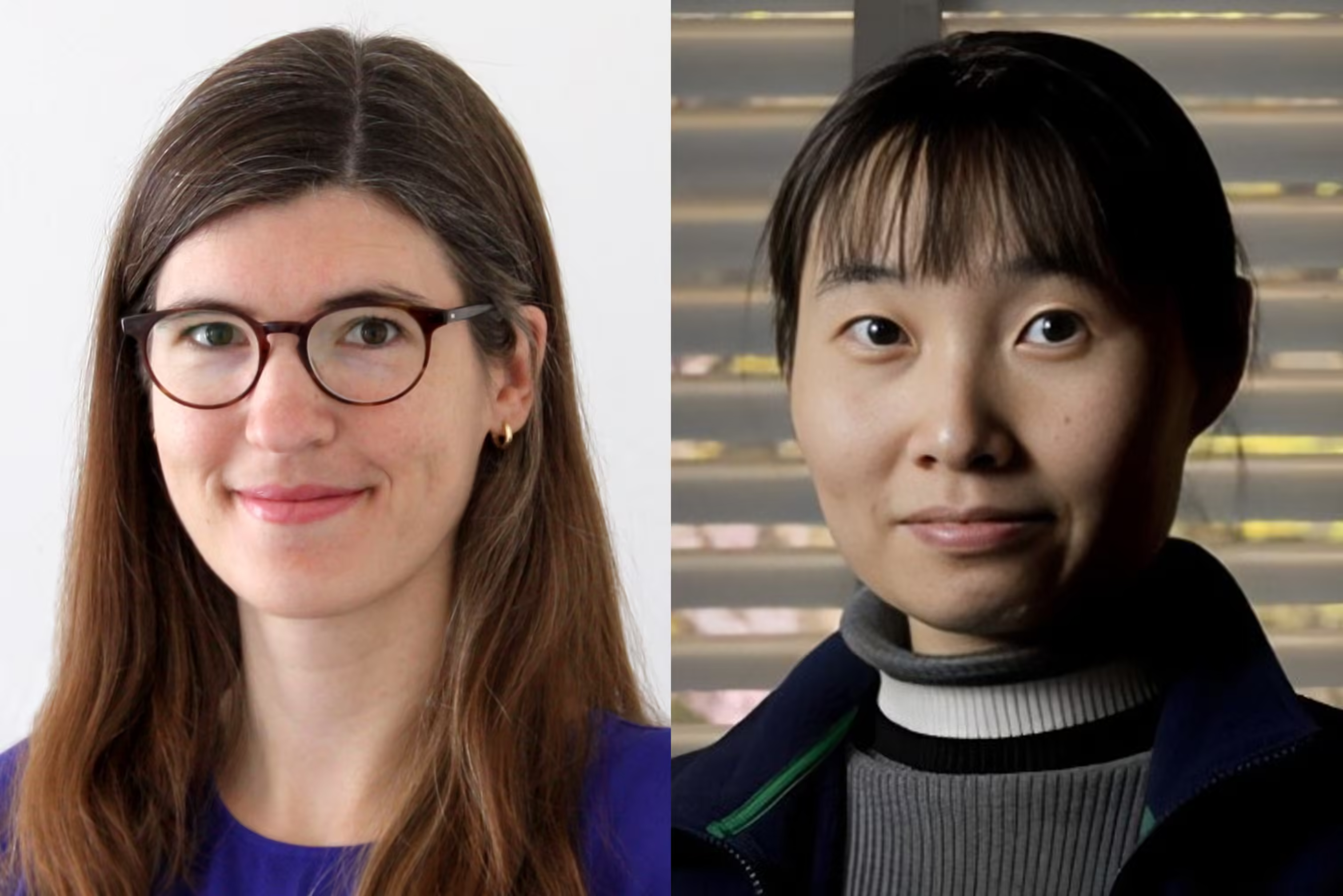MIT professors Laura Lewis and Jing Kong have been honored with the MIT Postdoctoral Association’s Excellence in Postdoctoral Mentoring Award. This annual award recognizes faculty or principal investigators who are nominated by their current and former postdoctoral researchers for their outstanding efforts in fostering a supportive work environment and aiding in the professional development of postdocs.
This year, the award acknowledged exceptional mentors in two categories. Laura Lewis, an associate professor at the Athinoula A. Martinos Center for Biomedical Imaging and the Department of Electrical Engineering and Computer Science (EECS), was recognized as an early-career mentor. Jing Kong, the Jerry McAfee (1940) Professor of Engineering in the Research Laboratory of Electronics and EECS, was acknowledged as an established mentor.
"Postdoctoral researchers require a broad spectrum of mentoring," said Vipindev Adat Vasudevan, who chaired the committee organizing the award. "Each postdoc has different needs. Some will enter industry, others academia, each with unique goals."
The award was presented by Vasudevan during a luncheon hosted by the Office of the Vice President for Research on September 25, in celebration of National Postdoc Appreciation Week. This annual event honors the contributions of the postdoctoral community at MIT, bringing together hundreds of postdocs and faculty members.
"The award recognizes faculty who go above and beyond to create a professional, supportive, and inclusive environment that fosters postdoctoral growth and success," said Ian Waitz, Vice President for Research, during the luncheon. He emphasized the crucial role postdocs play in advancing research at MIT, mentoring students, and connecting with global colleagues while launching their independent research careers.
"The Best Part of My Job"
Nomination letters for Lewis highlighted her ability to create an inclusive and welcoming lab environment. One nominator noted, "She invests significant time and effort into nurturing personalized mentoring relationships, ensuring each postdoc in her lab receives guidance and support tailored to their individual goals and circumstances."
Others praised Lewis for facilitating collaborations that advanced postdocs’ research goals. She encouraged them to work with other researchers to build their independence and professional development, as well as to develop their own research questions. "I was never pushed to work on her projects—she guided me to pursue and develop my own," one nominator wrote.
Lewis’s lab explores new ways to image the human brain, integrating engineering with neuroscience. Enhancing neuroimaging techniques can improve our understanding of brain activity during sleep and wakefulness, helping researchers understand the impact of sleep on brain health.
"I love working with my postdocs and trainees; it’s honestly the best part of my job," says Lewis. "It’s important for individuals to be in an environment that helps them grow towards what they want to do."
Recognized as an early-career mentor, Lewis looks forward to seeing her postdocs’ career trajectories over time. Group members who return as collaborators bring new ideas and creative approaches, she says, adding, "I view this mentoring relationship as one that lasts a lifetime."
"No Ego, No Bias, Just Solid Facts"
Kong’s nomination also highlighted the enduring nature of the mentoring relationship. The 13 letters supporting Kong’s nomination came from both past and current postdocs. Nearly all mentioned her kindness and the culture of respect she fosters in the lab, alongside high expectations for scientific rigor.
"No ego, no bias, just solid facts and direct evidence," one nominator wrote. "During discussions, she would ask many questions that made you think, ‘I should have asked myself that’ or ‘Why didn’t I think of that?’"
Kong was also praised for her long-term vision for projects and her guidance through temporary challenges. One nominator recounted a time when project results were less promising than expected: "Jing didn’t push me to change direction; instead, she was always happy to listen and discuss new findings. With her encouragement and long-term support, I eventually achieved great results on that project."
Kong’s lab focuses on the chemical synthesis of nanomaterials, such as carbon nanotubes, aiming to characterize their structures and identify applications. Kong notes that postdocs are crucial in introducing new ideas to the lab.
"I learn a lot from each of them. They always have a different perspective and unique talents. We learn from each other," she says. As a mentor, she sees her role as developing postdocs’ individual talents while encouraging collaboration with group members who have different strengths.
Collaborations facilitated by Kong extend beyond the postdocs’ time at MIT. She views the postdoctoral period as a key stage in developing a professional network: "Their networking starts from the first day they join the group. In this process, they are already building connections with other group members and our collaborators, which will continue for many years."
About the Award
The Excellence in Postdoctoral Mentoring Award has been given since 2022. With support from Ann Skoczenski, director of Postdoctoral Services at the Office of the VPR, and the Faculty Advisory Committee on Postdoctoral Studies, nominations are evaluated based on four criteria:
- Excellence in promoting and encouraging professional skill development and growth towards independence;
- Ability to foster an inclusive work environment where postdoctoral mentees from diverse backgrounds and perspectives are empowered to engage in the mentor-mentee relationship;
- Ability to support postdoctoral mentees in pursuing their chosen career paths; and
- Commitment to an ongoing professional mentoring relationship with mentees beyond the postdoctoral term.
The award includes a celebratory luncheon for the awardee’s research group and the opportunity to participate in a mentoring seminar or panel discussion for the postdoctoral community. Last year’s award was given to Jesse Kroll, the Peter de Florez Professor of Civil and Environmental Engineering, Professor of Chemical Engineering, and Director of the Ralph M. Parsons Laboratory.



